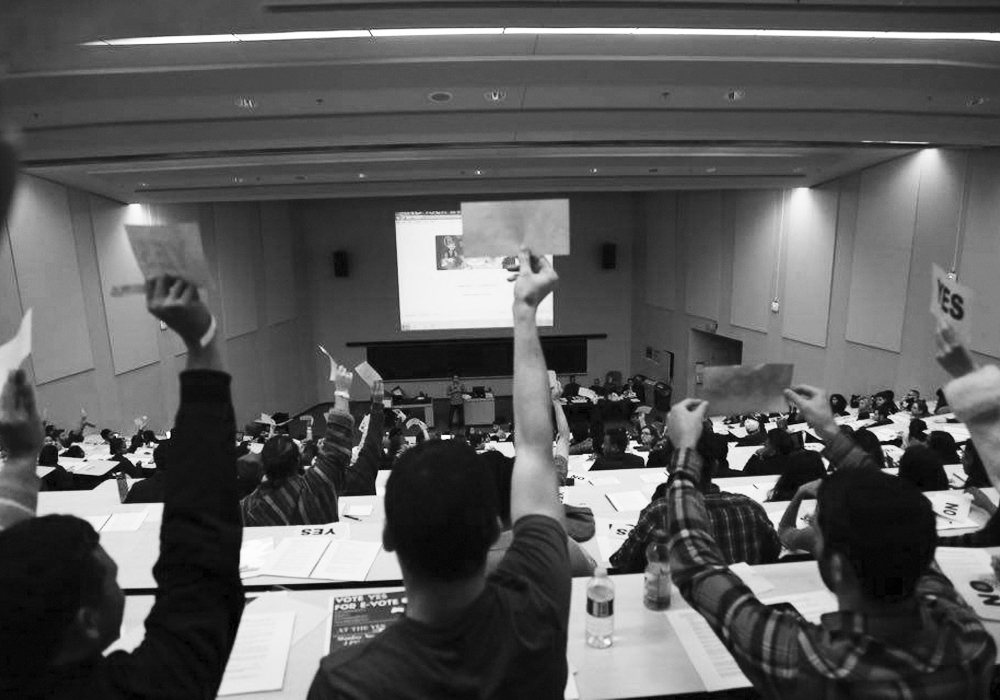Victoria Goldberg | Editor-in-Chief
Featured image: The annual general meeting is meant to foster feedback on YFS’ operations, but had a visibly low attendance rate. | Jun Wang
YFS’ annual general meeting, held this past November 30, is held every year as a chance for students to provide feedback on operations and direction for the next year, but recently drew mixed reactions from attendees.
The annual general meeting, or AGM, is meant to promote democratic participation among students and hold elected officers accountable.
“I think that the AGM was mostly well-organized and executed appropriately in terms of promoting the democratic process,” says Eli Razimor, fourth-year global political studies student.
In the motion for the YFS to condemn the impending sale of Hydro One, Razimor believes the discussion was subjected to rigorous and civil debate.
“Students stated their opinions and proposed amendments to the original motion. This was an example of the democratic process at its best,” he says.
However, he also points to a particular incident, which he claims endangered civic participation at the AGM.
The motion to stand in solidarity with the Indigenous community protesting the construction of the Dakota pipeline was presented by Alexandria Williams, VP Equity for students. While Razimor says he was in favour of the motion, he took issue with the language used.
Razimor found the wording used by Williams to be “highly unprofessional” and “potentially intimidating,” with Williams apparently using threatening language and swearing.
“After I went up to the microphone and voiced my opposition against such language, I was accused of using language [that] was racist, misogynistic and colonialist. As a liberal-minded person who supports and promotes equality for everyone regardless of their race, ethnicity, religion, gender and sexual orientation, I was in shock,” says Razimor.
Williams was not available for comment at the time of publication.
During her speech, Williams remarked that in her position as VP Equity she will not be apologetic about taking a firm stance on an issue concerning the marginalization of the Indigenous community and persons of colour.
Chenthoori Malankov, YFS president, emphasizes that the motion was intended to encourage members to become more aware of the impact that colonization has had on the Indigenous people.
“The YFS has unapologetically stood in solidarity with Indigenous people around the world and we will continue to do so,” she asserts.
While the AGM is meant to foster discussion, disagreements on sensitive topics can be found. An anti-oppression officer is present at meetings, a service which Malankov says is there to maintain a safe space.
Noam Sibony, a first-year biophysics student, claims the position of an anti-oppression officer exists under the guise of protecting the equity of students, but in reality is a position that shuts down those who don’t politically agree with the YFS.
The anti-oppression officer named for the AGM was Yusra Khogali, one of the co-founders of Black Lives Matter Toronto.
Sibony cites an instance when a student who voiced opposition to a motion had his microphone snagged away by Khogali after the chair pointed out that he was going off-topic.
“I do not believe that those principles [of equity, fairness, accessibility and combatting discrimination] were upheld by Yusra Khogali,” claims Razimor.
“The anti-oppression officer is a service available to folks who feel they were triggered in the space. Accessing the anti-oppression officer is an option for folks, among many other options, including voicing concerns at the microphone. These are options available to members in order to protect the democratic process,” explains Malankov.
Critics argue that many of the motions addressed by the AGM are concerned with international politics—issues that are not directly relevant to students, and that the event tends to be dominated by YFS’ political supporters, ensuring a majority by design so that the outcomes are inevitably in their favor.
“Students who vote against popular votes […] are laughed at or whispered about, further humiliating and intimidating them,” claims Sibony.
Other concerns about the AGM include lack of marketing the event, unlike other YFS events that are heavily publicized, and a call for reform of the voting process to ensure anonymity and a more diverse representation of student population.
“The AGM on November 30th was poorly attended, and students will not have another opportunity to provide any sort of input to our student government for many months,” says Maral Nour, activist for the Socialist Fightback at York.
Malankov asserts that the notice of the AGM was provided in accordance with the bylaws of the YFS through their e-newsletter and posters that were put up around campus.
YFS bylaws state the requirement of attendance of 250 members, either in person or by proxy, in order to form a quorum at the annual meeting of the Federation. If no quorum is present, the meeting shall be adjourned until the next regular meeting of the Board.
Physical attendance at the AGM was visibly far less than 250. When asked if this was in violation of their bylaws, Malankov maintains that quorum was present throughout the entire meeting as students debated the motions and voted in a healthy and respectful manner.


